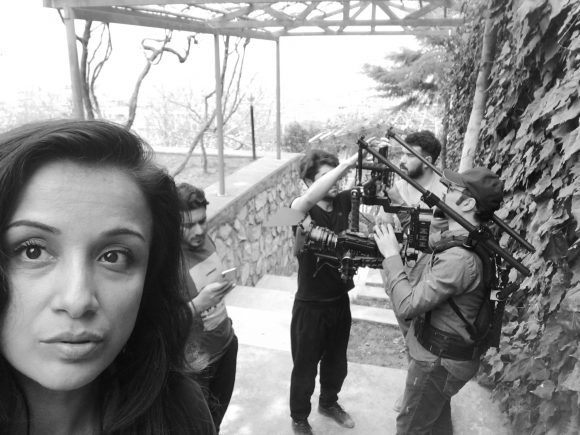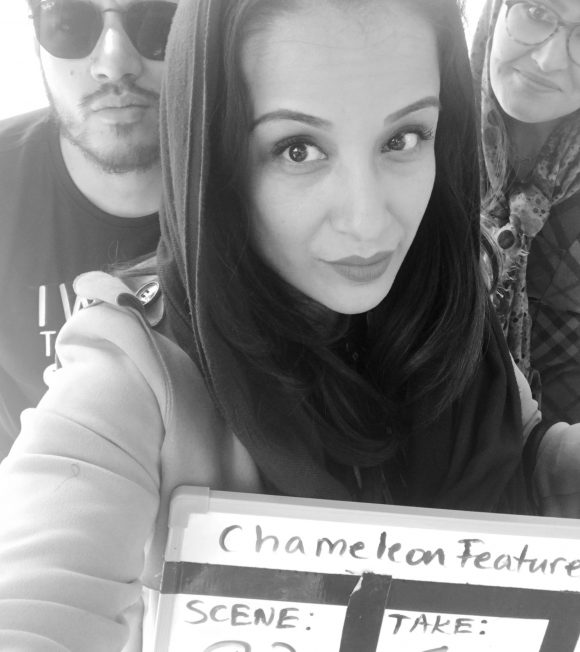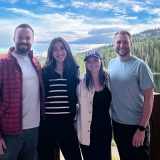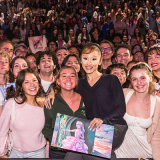Dodge College Alumni Featured in Rolling Stone after Escape from Taliban Takeover with Fereshta Kazemi
October 4, 2021

On the morning of August 13th, Afghan-American actress, filmmaker, and Dodge College Alumni Fereshta Kazemi was in her production office in Kabul working on the trailer for her upcoming film.
Only 72 hours later, she was narrowly escaping the country as city after city fell to the Taliban.
Fereshta recently shared her story about her escape from Kabul with Rolling Stone Magazine. We had the opportunity to hear more from Fereshta about her experience with sharing her story, and her journey as an Afghan-American filmmaker:
 What inspired you to pursue a career in the film industry?
What inspired you to pursue a career in the film industry?
I’ve been acting in the U.S. since I was seven years old, but I was also a storyteller from that age. My first starring role on stage was in grade school as a stepsister named ‘Arroganza’ in “Cybernella”, by Claire Boiko, a play about Cinderella in the cyber age. I was offered the role of Cinderella, but I found the stepsister a much more interesting female to play because she spoke about females empowering themselves, not waiting for others to save them. In grade school then, every year I had won the storytelling contest for my grade, from second grade on, up until 6th grade— which gave me some leverage to negotiate the role I wanted to play in the world. I didn’t want to be Cinderella; I wanted to be the story that I saw in the world. That’s what has inspired me to purse a career in film as both a filmmaker along with acting. Actors are important—because underrepresented groups in America can truly see themselves in the light of American culture, through the actor, allowing them to fully take part in being American in the culture we all share. They are part of the American dream of the “huddled masses yearning to be free,” who arrive to America from war and devastation around the world. So, it’s important to get their story right, and allow them to see themselves; being a filmmaker helps me be part of getting the story right.
What can you tell us about your experience being featured in Rolling Stone?
It was bittersweet for me— a milestone moment in my life as a creative, as an Afghan-American, to be featured in Rolling Stone—that the story of my creative endeavors and fight and work in Afghanistan mattered, that how I got out mattered, that I stayed alive mattered, and that what I thought and had to say for Afghanistan and the Afghan people mattered. The hard part was it was happening while vulnerable Afghans were running for their lives at the airport, being killed, bombed, desperate to get away from the cruelty, human rights violations, and oppression from the Taliban. To be representing my culture, but also seeing it being taken over in the country by extremists with no regard for humanity, for women, or the rule of law and a hatred of culture— destroying the instruments of the Afghan National Institute of Music, destroying historic archaeological sites such as the ‘Greshk’ fortress in Helmand, banning music, banning singing, banning TV serials and films, Afghan artists hiding or destroying their art for fear of being assassinated, Taliban taking over the Afghan Presidential Palace, which holds all the Afghan National film archives—was a shock to my psyche. The Rolling Stone platform helped though—my American culture holding me up to speak, through this assault and destruction of my Afghan heritage.
 What do you hope that readers will take away from learning about your story?
What do you hope that readers will take away from learning about your story?
I hope readers will understand that it is important to see and understand the world outside of America. America is so insulated and privileged. There are people around the world living lives most Americans couldn’t even imagine. Culture impacts our views and sense of being in the world. To see outside of America is to also see yourself as an American more clearly, to appreciate all our freedoms and rights, and see where needs work.
What motivates you to keep speaking out and sharing your story despite all the obstacles in your way?
What motivates is my identity as an Afghan and an American, and the utter injustice Afghans have been facing for forty years. As an Afghan, I feel the injustice Afghans face in visceral way, so I will keep speaking out. As an American, I’ve had the privilege of growing in a democracy with peace and justice; and feel Afghans deserve the same, and will keep using my privilege to speak up, until they get that.
What is next for you? How do you think that your experience of fleeing Afghanistan will influence your voice as a filmmaker and an artist?
I invested in a Film and Arts production company in Kabul, “Chameleon Features”, and just produced and directed a narrative feature film under it. I also produced a number of film art installations, short one to seven minute pieces highlighting an artistic concept through various forms of writing and art through film. I had to flee, leaving a large portion of my production company assets behind. I have my feature film and the film art installations. While I have had hard days, I am pulling my heart, will and mind together to quickly rebuild my production company. We are editing the film and the installations now, and I look forward to sharing it with the US and global film community.


